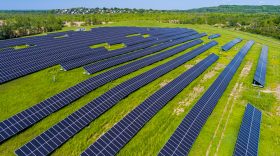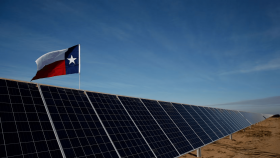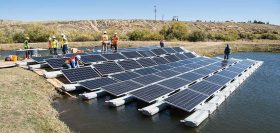Last month’s petitions from U.S. solar firms demanding countervailing duties of 100 percent on Chinese solar panel imports have been met with widespread consternation from Chinese stakeholders.
The October 19 Coalition for American Solar Manufacturing (CASM) anti-dumping petitions garnered an immediate response from the Chinese Ministry of Commerce, calling the claims unfounded and inappropriate. And criticism from the Chinese side has continued in a steady stream.
Jealousy an explanation?
On October 29, The China Energy News published a front-page commentary calling the trade petitions a result of envy at the rapid development of Chinese solar firms.
The article was written by Wang Yuehai, secretary general of the All China Federation of Industry and Commerce’s new energy commission.
“The U.S. solar industry is using the awkwardness of the Obama government to try and force it into trade protectionism and attack the rapid development of China’s solar industry,” Wang wrote.
According to Wang, President Obama has failed on this promise of growth from supporting renewable energy, leaving a gap for Chinese leadership. Wang believes the Coalition is taking out its’ frustration on the Chinese firms, rather than the real target: President Obama.
Wang also noted the harmful impact the petitions’ success would have on climate change and the effort to increase global economic growth.
Further Government Appeals

Chinese factory workers at the plant of Astronergy Solar Energy Technology Co., Ltd. Photo Credit: Associated Press.
According to People’s Daily, on October 26 the China Chamber of International Commerce (CCOIC) sent a letter to it’s U.S. counterpart arguing against launching investigations into the allegations.
The Chinese newspaper reported that Wang Xiaokang, vice chairman of the CCOIC and chairman of the China Energy Conservation and Environmental Protection Group, said actions against Chinese solar imports would negatively affect both the Chinese and U.S. solar industries.
Citing the fact that the U.S. exports raw materials and equipment needed for PV manufacturing to China, Wang said that if countervailing duties decrease the imports of Chinese PV panels, “U.S. exports to China will also be affected, resulting in a double-loss.”
Industry Concern
Meanwhile, Chinese firms have also come out against the potential countervailing duties. The U.S. is a large importer of Chinese solar panels; price increases would lower demand, putting some Chinese firms out of business.
In anticipation of these price rises, on November 7, China’s largest solar power plant developer put a $500 million U.S. project on hold.
CECEP Solar Energy Technology Co Ltd had planned to install Chinese-made solar panels in California, Texas and New Jersey. Solar panels account for around 70 percent of the project’s costs. If the anti-dumping petitions are successful, these installations will no longer be profitable.
“If the solar panel prices increase by, say 30 percent, in the United States, following the move, then we would certainly drop the plan because there’s no profit to be made,” said CECEP general manager Cao Huabin.
“If Chinese solar panel manufacturers can’t survive, their equipment suppliers in Europe can’t survive; if there are no cheap Chinese solar panels in the market, many U.S. solar power developers will be forced to stop their plans,” Cao continued.
People’s Daily reported that an industry group also publicly opposed the moves last week, urging the coalition to withdraw the petition and noting potential losses for the U.S. solar industry due to the integration of the global PV supply chain.
Last year, the U.S. had a record export surplus, thanks in part to raw materials and equipment sold to China.
“If the US government raises (duties) on the Chinese PV products, the cost of US PV products will increase and the market will be downsized,” said Li Junfeng, secretary-general of the Chinese Renewable Energy Industries Association. “These equipment manufacturers and material suppliers [selling products to China] will suffer as a result.”
Jiang Heng, a researcher at the Chinese Academy of International Trade and Economic Cooperation of the Ministry of Commerce, predicted that Chinese firms will soon feel the heat.
“Regular production before mid-November at most large Chinese PV companies will not be influenced, but it will be hard after November,” Jiang said.




